Quartet Blu-ray Movie
HomeQuartet Blu-ray Movie 
Starz / Anchor Bay | 2012 | 98 min | Rated PG-13 | Jun 18, 2013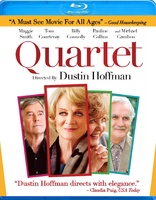
Movie rating
6.9 | / 10 |
Blu-ray rating
| Users | 4.3 | |
| Reviewer | 4.5 | |
| Overall | 4.3 |
Overview
Quartet (2012)
Dustin Hoffman directs this comedy drama adapted by writer Ronald Harwood from his own stage play of the same name. Beecham House is a retirement home with a difference: it specifically caters for former artistes including one-time opera singers Cissy (Pauline Collins), Reginald (Tom Courtenay) and Wilf (Billy Connolly). Once part of a quartet, the three still take part in an annual concert to celebrate the birthday of composer Giuseppe Verdi. But this year things are complicated by the arrival of the fourth member of their quartet, Jean (Maggie Smith), a die-hard diva who also happens to be Reginald's ex-wife. Theatrical temperaments and old hostilities flare as the dramatic foursome fuss, flirt and flounce their way through rehearsals, adhering emphatically to that old showbiz adage, 'the show must go on'.
Starring: Maggie Smith, Tom Courtenay, Pauline Collins, Billy Connolly, Michael GambonDirector: Dustin Hoffman
| Music | Uncertain |
| Drama | Uncertain |
| Comedy | Uncertain |
Specifications
Video
Video codec: MPEG-4 AVC
Video resolution: 1080p
Aspect ratio: 2.35:1
Original aspect ratio: 2.39:1
Audio
English: DTS-HD Master Audio 5.1 (48kHz, 24-bit)
French: Dolby Digital 5.1 (448 kbps)
Subtitles
English SDH, Spanish
Discs
25GB Blu-ray Disc
Single disc (1 BD)
Playback
Region A (C untested)
Review
Rating summary
| Movie | 4.5 | |
| Video | 5.0 | |
| Audio | 4.0 | |
| Extras | 3.0 | |
| Overall | 4.5 |
Quartet Blu-ray Movie Review
The Song Remains the Same
Reviewed by Michael Reuben June 22, 2013Dustin Hoffman was supposed to make his directorial debut in 1978 when he starred in a passion project called Straight Time, but the dedicated actor found the dual roles too onerous and replaced himself as director with the late Ulu Grossbard several days into filming. (The film remains one of Hoffman's greatest, if least known, performances.) It would be over forty years before Hoffman would again take the director's chair, but this time it was for a film in which he remained behind the camera. Cinematographer John de Borman, whom Hoffman knew from their project Last Chance Harvey, sent him the script for Quartet, adapted by Ronald Harwood (The Pianist) from his play of the same name. De Borman had obviously spotted in Hoffman the same quality that unites all of the characters in Harwood's story. Like Hoffman, having achieved an age north of 70, their undiminished joy in their artistic pursuits keeps them vital, even as time takes its physical toll. Or, as star Billy Connolly summed up the message of Quartet: "Don't die before you're dead!" Harwood's play was inspired by a 1984 Italian documentary, Tosca's Kiss, which featured interviews with residents of the Casa Verdi in Milan, a residence established under the will of composer Guiseppe Verdi for retired musicians. Harwood imagined an English equivalent, which he called Beecham House, established by a fictitious English musician in Verdi's honor, where music is heard daily, old show business rivalries endure and occasionally the smoldering embers of an unresolved love affair churn up clouds of smoke before being rekindled.
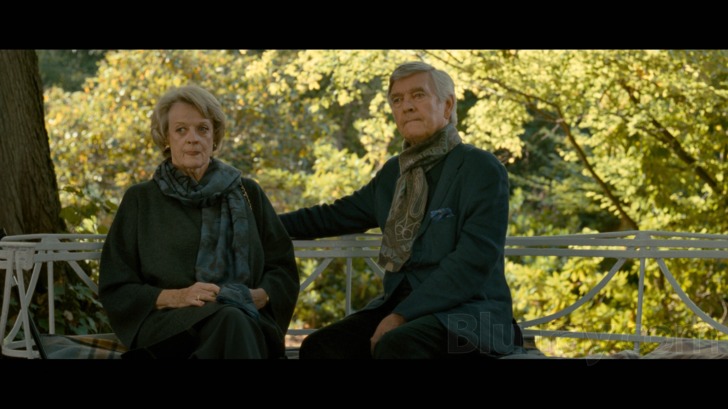
The "quartet" of the title is from Verdi's Rigoletto. Many years ago, it was sung in a performance so definitive that the recording has just been reissued on a new CD. Three of the four performers from that memorable company currently reside at Beecham House. Reg Paget (Tom Courtenay) is a gentle, regretful soul, who is currently trying to wrap his brain around hip-hop so that he can better relate to the high school classes to which he lectures about opera. Wilf Bond (Connolly) is a former lothario now reduced by age to being an irrepressible flirt. Since a recent stroke, Wilf has grown even less inhibited, but while his friends attribute this behavior to neurological damage, it more likely results from Wilf's realization that the end may come with the next dizzy spell. If nothing else, Wilf has the example of their former singing partner, Cissy Robson (Pauline Collins), who suffers from the early stages of dementia and with it has shed most of her self-consciousness. Except when she becomes disoriented, Cissy's days are perpetually cheerful, and she doesn't care what people think. The fourth member of the quartet is the most successful, Jean Horton (Maggie Smith), a world-famous soprano, who dreads the idea of retirement but fears even more appearing on stage when she can no longer perform at her peak. She arrives one day in secret and immediately takes to her room, instructing the young physician in charge of Beecham House, Dr. Lucy Cogan (Sheridan Smith), that she will take all her meals alone. Even the honor of a spontaneous ovation from her new housemates, when they realize what a celebrity has joined them, isn't enough to console Jean for what she feels she has lost. Jean's arrival stirs up drama at Beecham House (which already has plenty of it, given the former profession of the home's residents). The facility's finances depend on proceeds from an annual gala held every year on Verdi's birthday, and this year's sales are down. The imperious director, Cedric Livingstone (Michael Gambon, playing in a whole different register from his more familiar turn as the kindly Professor Dumbledore), hits on the idea of reuniting the four members of the famous Rigoletto quartet as a celebrity draw. Cedric's gimmick has several practical obstacles. For one thing, Jean won't sing in public. For another, Reg Paget won't speak to her, because they were once married and split under difficult circumstances that are gradually revealed throughout the film. Working out these conflicts is what drives the plot of Quartet. What lends the film its special quality, however, is the authentic musical texture that Hoffman and his casting director wove around the superb central cast by filling Beecham House with retired musical performers, many of whom (as Hoffman notes in his commentary) hadn't been asked to sing or play for years, but had maintained their skills anyway, for sheer love of the craft. During the closing credits, Hoffman and his editor include a montage of many of these players as they appear in the film next to old photographs from their performing days, and the range and variety are astonishing. All of the musical performances seen in the film were done live by the players cast in their parts, including a memorable aria by soprano Dame Gwyneth Jones, who took time from her own busy concert schedule to appear as Jean Holden's rival diva, Anne Langley. (No one can throw daggers with their eyes like a pair of dueling divas.) Just before the curtain rises on the gala performance, Dr. Cogan gives a short speech in which she thanks the residents of Beecham House for inspiring everyone who works there with their ability always to look forward. The words are more than a formality. Quartet contains numerous reminders that, in Bette Davis' famous quote (which Cissy Robson manages to recall in a moment of clarity), "old age isn't for sissies". One resident who suffers from angina must be carried off in an ambulance. Another is confined to the local infirmary after a bad fall, and when Jean Holton comes to visit, hobbling with her cane because of a chronic bad hip, she is surprised to find another old acquaintance in the next bed, much the worse for wear, but happy to see her after so many years. Jean should stop fussing and sing at the gala, he tells her. The alternative is to be "guest of honor at the crematorium".
Quartet Blu-ray Movie, Video Quality 
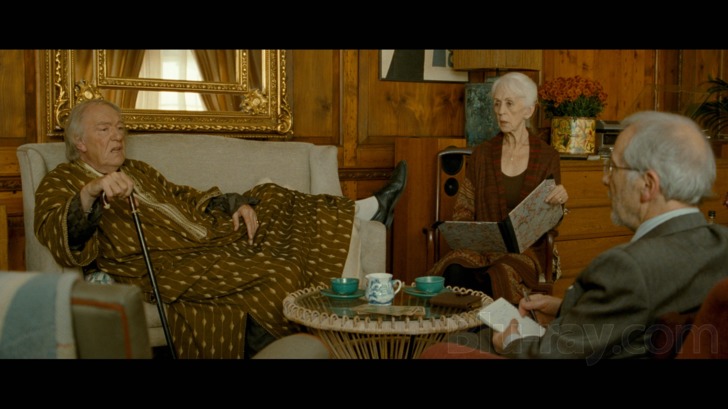
Shot on film by John de Borman, who initially sent Hoffman the script and is currently President of the British Society of Cinematographers, Quartet was finished on a digital intermediate and arrives on Blu-ray in an impressive 1080p, AVC-encoded presentation. De Borman's lighting is kind to the aged residents of Beecham House without trying to pretend they're younger than their age. The detailed Blu-ray image captures every crease and wrinkle, but it also registers every twitch of emotional expression that actors of this caliber express through their considerably agile features. (As Hoffman say in his commentary, British actors don't bother with cosmetic surgery like their American counterparts.) The pastoral English country surroundings have been captured with a degree of loving precision that a tourist board might want for its travel brochure. When the night of the gala finally arrives, the finery of both the performers and the attendees can be seen in minute detail, both the men in the black (genuinely black) evening attire and the ladies in their jewels and gowns, many of them sequined. Except for the gala, the film's color palette favors the pastel, which suits both the landscape and the faded wardrobe of Beecham House's clientele. A pattern of fine grain has been left in the film's visual texture by the DI process (which is not always the case with DI processing), and no apparent effort has been made in the Blu-ray's mastering to reduce or alter it. Compression errors were nowhere to be seen, and the image on Anchor Bay's disc appears to be about as close to perfect a reproduction of what one would encounter in a theatrical presentation as could possibly be obtained.
Quartet Blu-ray Movie, Audio Quality 
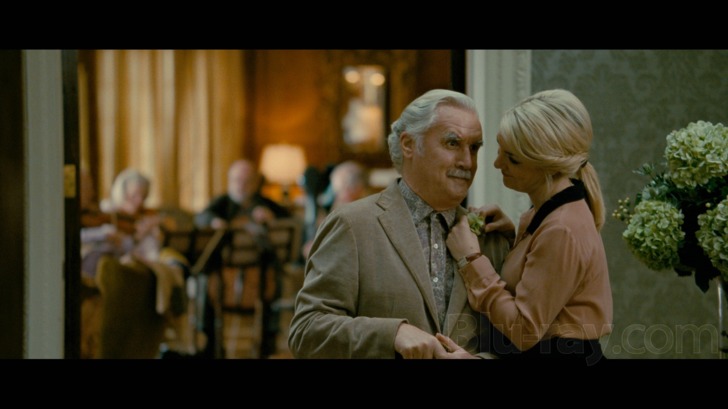
It should be obvious from the film's subject that the dominant presence of Quartet's DTS-HD MA 5.1 soundtrack is music, primarily opera but also English music hall, a bit of Gilbert & Sullivan, and even a touch of hip-hop, courtesy of the lectures presented by Reg to local students. As score composer Dario Marianelli (an Oscar winner for Atonement ) notes in the extras, his job on this film was to write short segments bridging between major compositions by Verdi, Rossini, Schubert and other classical composers. The job of the sound mixers was to keep the dialogue intelligible, while maintaining the credibility of each environment within and without the walls of Beecham House, all the while continually reminding the audience that the home's inhabitants hear music at all times, even when it's not actually playing. The finished track performs these multiple tasks admirably.
Quartet Blu-ray Movie, Special Features and Extras 
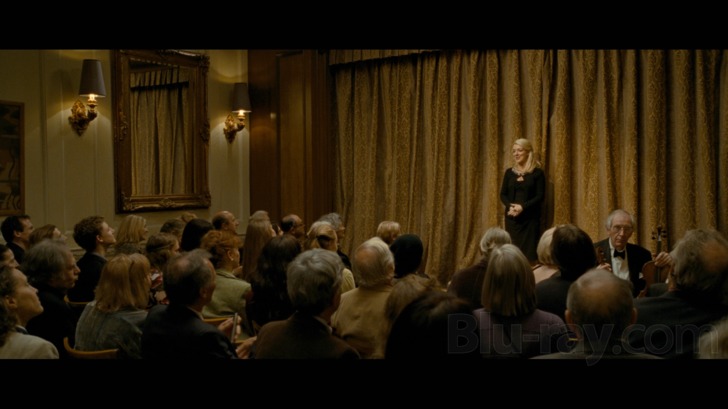
Anchor Bay continues to master its Blu-rays for The Weinstein Company with BD-Java but without including bookmarking. It's a bad design that prevents the user from stopping and resuming playback at the same point. Only on TWC discs does Anchor Bay do this.
- Commentary with Director Dustin Hoffman: Hoffman has always been a great talker, and his commentary is entertaining from beginning to end. As one might expect, he focuses on the actors, in both major and minor parts: their history, how they related to each other both on and off screen, details of performance, etc. In only a few instances does Hoffman relate his own part in directing the actors, but the examples are revealing of his style as a so-called "actors' director"—e.g., his discussion with Gambon about which elements of Cedric's character were important ("the rest will take care of itself"). He discusses the importance of having a good producer and casting director, the value of a talented editor, and the practical limitations of working within the budget of an independent film. And he repeatedly expresses his admiration for the cast's musicians, who entertained the rest of the cast and crew during every day of production.
- Behind-the-Scenes Featurettes (480i; 1.78:1; 14:49): Though broken up into individual sections, these are best played together with the "play all" feature. They combine interviews with Hoffman and a wide selection from the cast, both principal and supporting players, along with on-set footage as the director and cast rehearse, block and shoot various scenes.
- The Director
- The Story
- The Music
- The Salsa
- The Dance
- The Chairlift
- Introductory Trailers: At startup, the disc plays trailers (in 1080p) for The Intouchables, The Artist and The Sapphires, which can be skipped with the chapter forward button and are not otherwise available once the disc loads.
Quartet Blu-ray Movie, Overall Score and Recommendation 
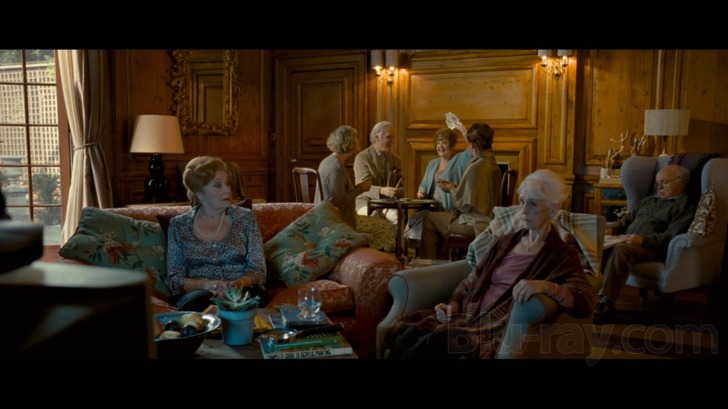
It's easy to imagine how Quartet could have become a treacly mass of sentiment, but Hoffman and his spirited ensemble never let that happen. Everyone involved—the writer, the director and the stars—are far too aware, and too respectful, of the fact that remaining vital and focused as time wears away at you is a serious business (even if, like Connolly, one's business is comedy). As Hoffman recalls in his commentary, and many moviegoers may not be aware, Maggie Smith, the two-time Oscar-winning actress whom generations now know as Professor Minerva McGonagall had retired in the late Eighties after a long and debilitating illness. Her love of acting brought her back in 1991's Hook, and she has continued working ever since. In Quartet, Dame Maggie breaks new cinematic ground as she utters the f-word for the first time in a screen career spanning over fifty years. She says it beautifully. Highly recommended.
Similar titles
Similar titles you might also like

Taking Woodstock
2009

Ricki and the Flash
2015

Swing Kids
1993

For the Boys
1991

Beaches
1988

Hard Core Logo
1996

Rudderless
2014

The Soloist
2009

Soul Men
2008

The Adventures of Priscilla, Queen of the Desert
1994

A Mighty Wind
Warner Archive Collection
2003

Sweet Dreams
1985

Prey for Rock & Roll
2003

Kinky Boots
2005

Music of the Heart
1999

Velvet Goldmine
1998

Billy Elliot
2000

A Prairie Home Companion
Warner Archive Collection
2006

Duets
2000

Same Kind of Different as Me
2017